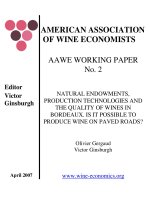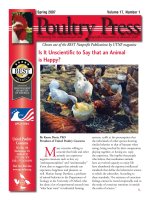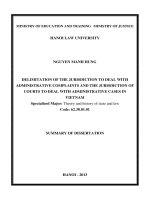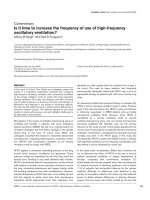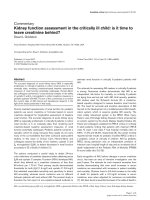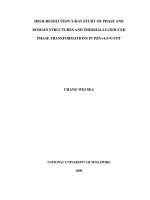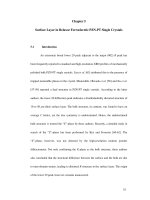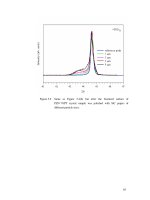Is it important to deal with the structures and how to use them in the right way
Bạn đang xem bản rút gọn của tài liệu. Xem và tải ngay bản đầy đủ của tài liệu tại đây (227.72 KB, 20 trang )
THANH HOA DEPARTMENT OF EDUCATION AND TRAINING
NONG CONG DEPARTMENT OF EDUCATION AND TRAINING
---***---
IS IT IMPORTANT TO DEAL WITH THE
STRUCTURES AND KNOW HOW TO USE THEM IN
THE RIGHT WAY ?
My full name: Nguyễn Thị Sỹ
Truong Son Secondary School
THANH HOA- 2017
1
PART I: INTRODUCTION
1. The reason:
The world is changing faster and faster in the early 21 st
century in our everyday life. For this reason, the Vietnamese
people have to be ware of improving the knowledge and social
skills in order to change a developing country into a developed
country in the fastest way and we can afford our modern life.
As you know, English is an international language. It is spoken in many
corners in the world. It is not only the first language of many countries but also
the compulsary subject in the schools in all countries in the world. So, it is
becoming more and more important in modern life. In addition,
communication is the key to our modern life and it makes the
world a small village. To know how to use modern technology
and inventions of the world is very important, so we need to use
English in the right way.
Furthermore, English is more popular nowadays and a lot of Viet Namese
people know how English is important. Moreover, last year English was widen
by A1group with English- Math- Physics in the entrance exam to university. It
made students happy, especially, students who love English because they have
more opportunities. Besides that, students have to pass the high school exam
with Maths - Literature- English from this school year in Thanh Hoa province as
well as all the provinces in Vietnam. It makes a lot of Vietnamese people
understand that English is not only an important subject but also a common
language in modern life in Vietnam.
However, in some cities, English isn’t really used everyday.
Some people use it as a means of communication but many
can’t or even never use. Especially, our secondary students
learn English at school, but they rarely speak English in the
class.
In addition to this, many learners have difficulty in learning
a foreign language and sometimes they find it boring in English
classes. Some don’t feel self-confident in public.
It is the fact that, in some secondary schools, teaching and learning
English do not concern oneself with English as much as we expect. Because
many students and their parents think that they will spend more time learning
English when they are in high school and university as well as learning English
in high school and university are more important and useful than learning
Emglish in secondary schools. Especially, my homevillage where I have taught
is a poor village, students learn at school without the help of the mordern
equipment, such as: listeningroom, earphones, projectors and so on. So, English
2
becomes quite dificult for them to learn and they do not understand how it is
deeply important.
Students in all some secondary school prefer writing and reading tests to
listening and speaking tests. In all types of writing test, students usually have
difficulty in rewriting exercises because there are a lot of forms in these
exercises. Therefore, many teachers and students usually learn by heart all the
forms in order to do this exercises. It is a not good way for learners because it is
too difficult for learners to remember all the forms. So, learners usually have
difficulties in rewriting sentences without changing the meaning.
One of the most important things is that the teacher
should give students a good chance to speak English before the
class, so she can check her student’s pronunciation and how
exactly the grammar structures are used.
To do this actively, it is very necessary for teacher to
determine what they have to teach and how to deal with the
structures in each lesson.
For these reasons above, I’d like to tell you how to deal
with the structures and how to use them in the right way. In my
opinion, following these rules, not only will you teach new
structures actively but also you will save time to do other things
in each lesson.
As a result, I choose the subject: “ Is it important to deal with the structures
and how to use them in the right way? ’’
2. The purpose:
With this aspect of studying how to deal with the stuctures
and how to use them in the right way, I’d like to share my little
experience innovation with you that will help students of the
secondary school learn the use of the structure and can rewrite
the sentence without changing the meaning more easily and
effectively.
3. The participants and time:
Students of class 9 of Truong Son Secondary School
School year: 2016- 2017
PART II: CONTENT
1. Theoretical background
In English, there are a lot of modal sentences and each unit has also other
forms, so students usually have difficulty in remembering, dividing into the
3
groups which have the same meaning and how to use them. If the more teacher
makes a list of modal sentences in lessons, the more students will have difficulty
in their study. When students get troubles in their study, it will make students
impossible to learn well, so I choose this subject "Is it important to deal with
the structures and know how to use them in the right way" .
2. Practical background
I am a teacher of English, I always try my best to selfstudy in many
diferent ways, such as: reading reference books, learning online lessons on the
internet, attending the other teacher's lessons and so on. Because I want to find
out the suitable method of teaching for all students, especially bad students and
help them get good results. During my lessons, attending the other
teacher'slessons and checking students, I have known that rewriting sentences is
very exciting for good students but difficult for bad students. English has a lot of
forms and students can rewrite a model sentence in other with the same
meaning. This makes some weak students feel nervous and do not believe
themselves in their rewriting sentences and they are also afraid of their results. It
is the fact that there are a lot of sentences which are not the same model
sentences. Many students have difficulty in rewriting them because they offer
students who know how to use their knowledge actively and sometimes they
base on students’knowledge in their real life.
Nowadays, there are many kinds of rewriting sentences. I always want to help
my students improve their writing skill because of all the reasons above. In a
word, I give some solutions in order to solve this problem. I hope it will be
useful for other teachers and students during their teaching and studying.
3. The solutions
Instead of giving a list of model sentences, I divided into the following
groups while teaching each lesson.
3.1 Active and passive forms:
* Make/let sb do sth <=> S + be + made/let + V(+to) + O
Example:
The teacher made him go out because of his mobiphone.
-> He was made to go out because of his mobiphone.
* Have sb do sth <=> have sth done <=> get/ask/want/request sb to do sth
Usage: we use this form so as to depend on someone do something for us.
Example: 1. They had the porter carry their luggage to a taxi.
-> they had their luggage carried to a taxi by the porter.
4
2. I’m going to ask someone to mend my bicycle.
->I’m going to have my bicycle mended.
* Passive <=> active
Example: 1. The store was opened in 1932 by John.
-> John opened the store in 1932.
2. They bought this book last week.
-> This book was bought by them lastweek.
* People said/thought/ considered… that………..
-> It was said/thought/considered…that ………..
-> S + passive of verb + V(+ to)
Usage: we can rewrite this form by two ways:
Example: 1. People said that she is American.
-> It was said that she is American.
-> She was said to be American.
2. People thought that the children were kidnapped.
-> It was thought that the children were kidnapped.
-> The children were thought to be kidnapped.
* Can/have to/ must/ should/ ought to/ might/be able to/ be going to/…… + be +
V(pp)
Example: 1. Her parents used to take her to the zoo at weekends.
-> Her used to be taken to the zoo by her parents at weekend.
2. Are you going to buy a laptop next week?
-> Is a laptop going to be bought by you next week?
* Like/dislike/love + being + V(pp)
Example: 1. I don’t like people laughing at me.
-> I don’t like being laughed at by people.
3.2. Comparative forms:
* S1 + S2 + V + adj/adv <=> S1 + V + as adj/adv + as + S2
Example:
This pig and that pig are greedy.
-> This pig is as greedy as that one.
* S + V + but + S + V <=> S + V + comparative adj/adv/N + than + S +V
Example: We had eight calls today, but we only had six calls yesterday.
-> we had more calls yesterday than we had today.
* Equal form<=> comparative form
Example:
I can’t play tennis as well as my friends can.
-> My friends can play tennis better than I can.
* Comparative form<=>superlative form
Example:
Noone in the club dances better than Jane.
-> Jane dances the best in the club.
* Double comparative
Example:
As television programmes become more popular, they seem to get worse.
-> The more popular television programmes become, the worse they seem.
3.3. The conditional forms:
* The conditional sentence type 2
5
Example: 1. She is too short so she can’t play valleyball.
-> If she were tall, she could play valleyball.
2. I don’t eat anything so I am hungry now.
-> If I ate something, I wouldn’t be hungry now.
* The conditional sentence type 3
Example:
She didn’t have enough money so she couldn’t buy that house.
-> If she had had enough money, she could have bought this house.
* Unless<=>If…..not/If……………
Example:
If you don’t tell me, I will not know where he lives.
-> Unles you tell me, I won’t know where he lives.
Example:
1. If you help them, they will finish the report early.
-> Unless you help them, they won’t finish the report ealy..
2. If I had known that you were tired yesterday, I wouldn’t have invited you to
go out.
->Unless I had known that you were tired yesterday, I would have invited you to
go out.
* The of the conditional sentence:
If + S + had + V(PP) +O, S + would + have + V(PP) + O <=>
Had it not been for/ If it hadn’t been for+ N, S + would have + V(PP) + O
<=>But for + N, S + would + have + V(PP) + O
Example: If he hadn’t helped us, we couldn’t have finished work early.
-> Had it not been for his help, we couldn’t have finished work early.
-> But for his help, we couldn’t have finished work early.
3.4. Reported speech:
a. Invite/offer/suggest
Example: 1. “Would you like to go to the cinema tonight?”
-> She invited me to go to the cinema that night.
2. “Shall I bring you some tea?”
-> Tom offered to bring me some tea.
3. He asked: “Shall we meet at the park?”
-> He suggested meeting at the park.
b. will/would/ can/could used for offers:
Tom asked: “Will you help me, please?”
-> Tom asked me to help him.
Jane asked Tom: “Can you open the door for me, Tom?”
-> Jane asked Tom to open the door for her.
c. ask, beg, order, tell...
Example: He asked “Do your homework carefully!”
-> He asked me to do home work carefully.
d. Remind:
Example:
“Don’t forget to buy me a new hat, mum!”
-> The boy reminded his mum to buy him a new hat.
e. Advise:
6
Example:
“You’d better stay in bed and take a short rest”
-> The doctor advised him to stay in bed and take a rest.
f. Warn:
Example: “Don’t touch the switch!”
-> My mother warned me not to touch the switch
g. Accuse somebody of doing sth:
Example: “You were cheating,” said Carol to June.
-> Carol accused June of cheating.
h. Deny + V(ing):
Example:
“I don’t steal your money” Tom said to Jane.
-> Tom denies stealing Jane’s money.
i. Apologise to sb for + V - ing
Example:
“I’m sorry I didn’t close the window before leaving.”
-> she apologized for not closing the window before leaving.
3.5. The forms use the change of word forms:
* S + be +adj +prep <=> S + V + adv
Example:
Mary was kind to me.
-> Mary behaved me kindly.
* S + V + with + noun <=> S + V + adv
Example:
The student listened to the teacher with great attention.
-> The student listened to the teacher attentively.
* S + be + adj <=> What + a + adj + N/ How + adj + S + be!
Eg:
She is a very graceful girl
-> What a graceful girl! How beatiful the girl is!
* S + V + adv <=> How + adv + S + V!
Eg: She sang very beautifully -> How beautifully she sang!
* S + be + ed_adj <=> S + be + ing_adj
Eg:
1. the boy was excited about the film.
-> The film was exciting to the boy.
2. This book is very interesting
-> I am interested in the book
* S + V + N <=>S + be + adj <=> S + V + O
Eg:
1. She is a girl of great beauty.
-> She is beautiful.
2. The proof showed his innocence.
-> The proof showed that he is innocent.
3.6.The forms have the same meaning:
* Would rather…..than……<=> Prefer……to………
Form:
S + would rather + N/V(-to) + than + N / V(-to)
<=>S + prefer + N/V(ing) + to + N/V(ing)
Example:
7
1. She would rather watch football than play it
-> She prefers watching football to playing it
* S + like + N/V(+to) + better than + N/V(+to)
Example:
He likes to eat fish better than meat.
-> He would rather eat fish than meat.
-> He prefers eating fish to meat.
* S + would prefer + sb + V(+to) + O <=> S + would rather S + V(ed) + O
Example: He would prefer you to tell him a story.
-> He would rather you told him a story.
* Need to do <=> to be necessary for sb to do sth
Example:
You don’t need to send her message
-> It’s not necessary for you to send her message
* Understand = be aware of:
Example:
Do you understand what I have said?
-> Are you aware of what I have said?
* Succeed in doing sth = manage to do sth
Example:
We succeed in digging the Panama cannel.
-> We manage to dig the Panama cannel.
* Can do = be able to do = be possible to do:
Example:
He can’t walk on his foot.
-> He isn’t able to walk on his foot.
* like = enjoy = be interested in = be keen on:
Example: 1. He likes swimming = he is interested in swimming
* Not ….anymore = No longer + đảo ngữ + S no more + V
Example:
I don’t live in the countryside anymore.
-> No longer do I live in the countryside.
-> I no more live in the countryside.
* To be not worth doing = there is no point in doing sth
Example:
It’s not worth making him get up early.
-> There’s no point in making him get up early.
* Make an effort to do = attempt to do = try one’s best to do
Example: 1. They finally make an effort to put out the fire.
-> they finally attempt to put out the fire.
* be accustomed to + V(ing) <=> be used to + V(ing).
<=> be in the habit of + V(ing)
Example:
Jane isn’t accustomed to working so hard.
-> Jane isn’t used to working so hard.
* Sorry…<=> apologize to sbd for doing sth
Example:
“I’m sorry that I broke the glass,” said Peter.
-> Peter apologized to me for breaking the glass.
* S + V + O <=> S +prevent sth from doing sth
8
Example:
The train couldn’t run because of the fog.
-> The fog prevented the train from running.
* Not only……but also <=> both……and
Example:
1. It was a very boring film and it was very long, too.
-> The film was both boring and long.
-> The film was not only boring but also long.
2. She not only learns well but she also sings beautifully.
-> She both learns well and sings beautifully.
3.7. Sentence transformation between the present perfect and past simple
tense
* S + have/has not + V(p2) + O + for + period of time.
<=> It’s + period of time + since S + V(ed) + O.
Example:
I haven’t visited my parents for 5 years.
-> It’s 5 years since I last visited my parents.
* S + started/ began + V(ing) + O + period of time ago/ point of time.
<=> S + has/have + V(p2) + O + for + period of time/ since + point of time.
Example:
I began learning English 5 years ago.
-> I have learned English for 5 years.
* S + have/has not + V(p2) + O + for + period of time/ since + point of time.
<=> The last time + S + V(past simple) + was + period of time/ point of time.
Example:
The last time I saw him was 13 years ago.
-> I haven't seen him for 13 years.
* How long + have/has + S + V(p2) + O?
<=> When + did + S + start + V(ing) + O?
Example: How long have you worked in this company?
-> When did you start working in this company?
* This is the first time/ second time …<=> S have/has + never + V(p2) + O.
Example:
This is the first time I have ever gone to the cinema.
-> I have never gone to the cinema before.
3.8. The forms of the inversion:
3.8.1. Inversion of the verb after adverbs:
+ At no time + aux + S + V = S + neg_V
Example: 1. I never think that she loves me.
9
-> At no time do I think she loves me.
+ No sooner…..than…..<=> hardly…..when....
Example:
No sooner had the thief left than the police came.
-> Hardly had the thief left when the police came.
+ Under no circumstances + aux + S + V<=> S + neg_V.
Example: You shouldn't agree to the proposal.
-> Under no circumstances should you agree to the prposal.
+ some adverbs and phrasal averbs:
Never/ seldom/ Not only/ hardly/ only in this way/ scarcely/ nowhere/ on no
account/ only by/ not until-till/ only when-then...
3.8.2. Group: So, Such
a. SO.
+ So + adj + to be + N …
Example:
So strange was the situation that I couldn't sleep.
-> So difficult is the test that students need three months to prepare.
+ “So + adjective + to be + subject + that + clause
Example: 1. She is so beautiful that everyone turns to look at her.
-> So beautiful is she that everyone turns to look at her.
=> So + adj (beautiful) + be (is) + S (she) + that + clause (everyone… at
her)
2. The wind was so strong that we couldn’t open the window.
-> So strong was the wind that we couldn’t open the window.
=> So + adj (strong) + be (was) + S (the wind) + that + clause (we
couldn’t…)
+ “So + adverb + do/does/did + subject + main verb + that + clause”
Example:
He drove so carelessly that his car crashed into a tree.
-> So carelessly did he drive that his car crashed into a tree.
=> So + adv (carelessly) + did + S (he) + main verb (drive)
+ that + clause (his car… a tree)
b. Such
“Such + to be + noun/noun phrase, that + mệnh đề”
Example:
E.g1: Such was the wind’s force that we couldn’t open the window.
=> Such + be (was) + noun phrase (the wind’s force) + that + clause (we
couldn’t…)
10
E.g2: . Such was the popularity of the soap opera that the streets were a deserted
when it was on.
=> Such + be (was) + noun phrase (the popularity of…), that + clause “the
streets… was on”.
E.g 3. Such was a strong wind that we couldn’t open the window.
=> Such + be (was) + noun phrase (a + strong + wind), clause “we couldn’t
open the window.”
Eg4. She was such a beautiful girl (noun) that I couldn't stop myself from
looking at her.
=> Such + be (was) + noun phrase (a + beautiful +girl), that + clause “I
couldn't stop myself from looking at her.”
3.9. Relative clauses:
Relative pronouns: which, who, whose, why, where, whom, when, that
Usage:
-Find the words which have relation in two sentences.
- Define the adjective clause.
- Replace the relative words using relative pronoun.
-Rewrite the sentence .
Example:
1. We come to visit Hue city. We used to learn there
-> We come to visit Hue city where we used to learn
2. This is Mr John. He works in a university
-> This is Mr John who works in a university
3.10 Special forms:
* So…….that <=> such ………that
S + V + so +adj/adv + that + S + V + O
<=>S + V + such + adj + N + that S + V + O
Example: This exercise is so difficult that I can’t do it.
Adj
-> It is such a difficult exercise that I can’t do it.
NP
* S + V + so + adj + a/an + N that + S + V + O
Example:
This exercise is so difficult that I can’t do it.
-> It is so difficult an exercise that I can’t do it.
* So + adj/adv + aux + S + V + that + clause
Example:
Her grief was so great that she almost fainted
-> So great was her grief that she almost fainted
11
Beside that, we can rewrite this structure using ‘too” :
* S + V + too + adj/adv
+ (for somebody) + V(+to) + O
1. He spoke too fast for anybody to understand
-> She spoke so fast that noone could understand
2. This exercise is so difficult that I can’t do it
-> This exercise isdifficult for me to do.
* Too + adj/adv + for sb + to do<=> adj/adv + enough + for sb + to do
As you know, we can rewrite “so….…that” using “ too + adj/adv’ . Beside that,
we can rewrite “too + adj/adv” using “adj/adv + enough” :
* S + V + adj/adv + enough + for sb + V(+to)
Example:
1.This tea is too hot for me to drink
-> This tea is not cool enough for me to drink
2. He acted so well that the audience was moved to tears
-> He acted well enough for the audience to move to tears
Beside that, we can use this structure:
* can’t afford to do sth<=>too + adj + V(+to)
Example: We can’t afford to buy the car
-> The car is too expensive for us to buy
* It’s time (for sbd) to do something <=>It’s time + S + did sth
Example:
1. It’s time for us to go home.
-> It’s time we went home.
2. It’s time the children were in bed.
3. The windows are very dirty. I think it’s time we cleaned the
“It’s about time /It’s high time + sb + did…”
Example :
Jack is a great talker.
But it’s about time he did something instead of just talking.
* S + remember to do sth <=> S + negative of forget + to do sth
Example:
Remember to check your flight number.
-> Don’t forget to check your flight number.
* S + V + time <=>It + take/took/ will take + sb + time + V (+to)
Example: She wrote the letter in 30 minutes.
-> It took her 30 minutes to write the letter.
* Because + Clause <=> Because of + Noun/V(ing)
Example: 1. We didn’t go to school because it rains.
-> We didn’t go to school because of the rain.
2. She couldn’t tell you about that because she felt ashamed.
-> Because of feeling ashamed, she couldn’t tell you about that.
* Although/though/even though + clause <=>in spite of/Despite + N/V(ing)
Example:
Although she was very old, she was very graceful.
12
->Despite her age, she was very graceful.
Despite the fact that she was very old, she was very graceful.
We can use “ much as” to replace “ although” :
Example: Although I don’t like her behaviour, I admire her intelligence.
-> Much as I don’t like her behaviour, I admire her intelligence.
After in spite of / Despite we can use noun phrase, what or V(ing) :
Example: Despite what I said you last night, I still love you.
In spite of the fact that I was tired, I couldn’t sleep.
Despite being tired, I couldn’t sleep.
Although I was tired, I couldn’t sleep.
* It seems that = it appears that = it is likely that = it looks as if
Example:
It’s likely that he will come late
-> It looks as if he will come late
* Not …..until <=> Not until… + aux S + V = only when… + aux + S + V
<=>It was not until+ time/clause that + S +V(ed) + O
Example: 1. He doesn’t believe the truth until he opens the letter.
-> Only when/ not until he opens the letter does he believe the truth.
2. It was not until 2007 I began to work in Quan Son.
-> Not until 2007 did I begin to work in Quan Son.
* in case of + N, Clause…..
Example:
If there’s an emergency, ring this number.
-> In case of emergency, ring this number.
* No matter + what/when/how/where…:
Example:
1. I tried as hard as I could, I just couldn’t get the money
-> No matter how hard I tried, I just couldn’t get the money
2. You can say but I can’t agree with you
-> Now matter what you say, I can’t agree with you
* According to + N , S + V + O
Example: Our science correspondent sees this new invention as the answer to
many of our problems.
-> According to our science correspondent, this new invention is the answer to
many of our problem.
13
* Wish = if only
Example: 1. I would love to live in Paris for a year.
-> If only I would live in Paris for a year.
-> I wish I would live in Paris for a year.
2. What a pity I couldn’t come to your party.
-> If only I could have come to your party.
-> I wish I could have come to your party.
* Regardless of: ….<=> whether or not:
Example: We must continue our efforts, whether there are problem or not
-> Regardless of whatever problems, we must continue our efforts
* Only in this way:
Example: Only in this way could the problem be solved
* The only thing/way/solution + be …… <=> But for + N + clause
Example: 1. The only way to solve the problem is his help
-> But for his help we can’t solve the problem
2. The only difficulty we met with was money
-> But for money we can’t be free from difficulty
4. Practical types of exercise
Type 1: Rewrite each sentencewithout changing the meaning.
1. The trains couldn’t run because of the snow.
The
snow ............................................................................................
2. I didn’t arrive in time to see her.
I
wasn’t
early ....................................................................................
3. I’m sorry I was rude to you yesterday.
I
apologize .....................................................................................
....
4. He didn’t hurry, so he missed the train.
14
If ..................................................................................................
......
5. Janet is the best tennis- player in the club.
No
one ..............................................................................................
..
6. I haven’t seen that man here before.
It’s ................................................................................................
.......
7. The furniture was so expensive that I didn’t buy it.
The
furniture
was
too ..........................................................................
8. The robbers made the bank manager hand over the money.
The
bank
manger ...............................................................................
9. He learned to drive when he was 18.
He
has ...............................................................................................
.
10. She had never been unhappy before.
She
was
unhappier .............................................................................
Type 2: Choose ONE obtion that has the same meaning as the given one
1.Although he is intelligent, he doesn’t do well at school.
A. In spite of intelligent, he doesn’t do well at school.
B. In spite he is intelligent, he doesn’t do well at school.
C. Despite being intelligent, he doesn’t do well at school.
D. Although his intelligence, he does well at school
2. We didn’t go on holiday last year because we didn’t have
enough money
15
A. If we hadn’t had enough money, we wouldn’t have gone on
holiday last year.
B. If we had had enough money, we would have gone on
holiday last year.
C. If we hadn’t had enough money, we would have gone on
holiday last year.
D. Unless we had enough money, we would go on holiday last
year.
3. People protesting against pollution are marching to London.
A. People protest against pollution are marching to London.
B. People who protest against pollution are marching to London.
C. People who protesting against pollution are marching to
London.
D. People who protests against pollution are marching to
London.
4. The problem is difficult to solve.
A. It is difficult problem to solve.
B. It is a problem
difficult solve.
C. It is difficult to solve the problem.
D. It is difficult
solve the problem.
5. English is not easy to learn.
A. Learning English is not easy.
B. It is easy learning
English.
C. It is not easy to learn English.
D. It is not difficult to learn
English.
6. She would eat nothing but small pieces of bread and butter.
A. She ate small pieces of bread and butter but didn’t like them.
B. She ate only some small pieces of bread and butter.
C. She didn’t eat anything, not even the bread and butter.
D. She wouldn’t touch the bread and butter, but she ate other
things.
7. They arrived too late to get good seats.
A. When they arrived the good seats were already taken.
B. Although they were late they found some good seats
16
C. They got good seats some time after they arrived.
D. They had to stand for the whole show.
8. Seeing that he was so angry, she left the office.
A. She didn’t want to make him angry, so she left.
B. She left the office when she saw how angry he was.
C. He grew very angry when he saw her leaving the office.
D. He wouldn’t have been so angry if she hadn’t left.
9. Mary might phone while we were out.
A. Unfortunately we were out when Mary phone.
B. We were sure Mary had phoned while we were out.
C. Possibly Mary phoned while we were out.
D. Mary ought to have phoned while we were out.
10. He delayed writing the book until he had done a lot of
research.
A. It was only when he had written the book that he did a lot of
research.
B. He did a lot of research after he finished writing the book.
C. He delayed writing the book as he had hardly done any
research.
D. Only after he had done a lot of research did he begin to write
the book.
Type 3: Find out one mistake in each sentence by cirling it and correct it.
1. Jane appologised to me by coming late
A
B
C
D
2. Hardly has he gone out when it rained
A B
C
D
3. This is so a difficult exercise that we can’t do it
A
B
C
D
4. All of his friends were surprising at his success.
A
B
C
D
5. Peter is the boy whom I think scored the winning points for
the bastket ball.
A
B
C
D
17
Exercise 4: Choose the best answer to complete the following sentences.
1. We have dicided to……………..the money for the local secondary school
A. beg
B. collect
C. raise
D. rise
2. At present the school cannot………..to buy all the computers it needed
A. afford
B. have
C. risk
D. have enough
3. He accused his friends …………taking his money
A. in
B. out
C. of
D. up
4. The more money you have, the ………….you are
A. happy
B. happier
C. more happy
D. as happy
5. I’d rather …………at home than go out tonight
A. stay
B. to stay
C. stayed
D. staying
6.Dispite my …………, I still go camping
A. tired
B. tiring
C. tire
D. tireness
7. She didn’t get…………….well with her boss, so she left the company
A. at
B. on
C. through
D. up
8. My mother is …………old to work hard
A. so
B. too
C. enough
D. even
9. Not until he came into light…………………….
A. I recognized him
B. that I recognized him
C. did I recognized him
D. did I recognize him
10. Please don’t didturb me……………..there is something urgent
A. if
B. or
C. otherwise
D. unless
5. The results
During the teaching time in the class, selfstudying time and especially,
teaching good students, I realized that we should divide the model sentences into
groups which have the same meaning and usage instead of making a list of
model sentences for students. After that, we should give students exercises to
practice and then give them some situations in the lessons and sometimes in the
life. This makes students more active in their study and it also becomes more
attractive to students.
Moreover, it helps students understand how to use the structures to write
the second sentences without changing the meaning of the first sentence more
18
easily. Students do not rewrite them by learning by heart. They use their
knowledge to rewrite sentences.
Furthermore, students are not afraid of rewriting form. They are really
interested in doing them. They actively find, exchange and do other forms of
rewriting sentences. After I had researched, selfstudied and especially taught
students using this method for a long time, I realized that students’results are
better. As a result, students did the three 15-minite tests better.
The result of the first 15-minute test:
Total
40
Mark 0-3
%
15(37.5%)
Mark 4-5
%
20(50%)
Mark6-8
%
5(12.5%)
Mark 9-10
%
0
The result of the second 15-minute test:
Total
40
Mark 0-3
%
10(25%)
Mark 4-5
%
15(37.5%)
Mark 6-8
%
10(25%)
Mark 9-10
%
5(12.5%)
The result of the third 15-minute test:
Total
40
Mark 0-3
%
3(7.5%)
Mark 4-5
%
7(17.5%)
Mark 6-8
%
20(50%)
Mark 9-10
%
10(25%)
After three checkings, my students understand basic English
forms
and know how to use them. At this time, my
students are interested in learning English and they are fond of doing rewriting
exercises. So, their results are getting better and better.
6. Advantages and limitations:
6.1 Advantages:
+ It can widely be applied and has high feasibility.
+ Students feel self-confident and creative. They are
interested in the lessons.
+ It helps the teacher save time.
6.2 Limitations:
+ Students do not have enough equipment to support their
learning English when they are at home.
19
+ They have no chance to communicate with native
speakers.
+ The awareness of the language level is low because most
students live in the country.
PART III. ADJUSTMENTS
Throughout the teaching process, I have some
adjustments to share with you. I will be really difficult for the
teacher to teach effectively if students do not like English or
they don’t concentrate on it. For me when teaching a lesson, I
gave
students clear instructions, helped the weak ones,
motivated them as much as possible. I tried to make the lesson
easier and more interesting, so students got involved and paid
more attion to it. Moreover, I helped them to find the best ways
of learning a foreign language and gave them a chance to
practise pronouncing the words better.
PART IV: CONCLUSION
Nobody can not deny that the benefits of understanding English forms
clearly because it is very useful. They help us write and speak English correctly.
And when we understand all the modal sentences clearly, we can rewrite other
forms more easily. In the past, we always tried our best to translate into
Vietnamese and then rewrite them by using words by words or we always tried
our best to learn by heart all the modal sentences without understanding. So, we
can rewrite sentences which are the same words and meaning and we can not
rewrite sentences which we have met. Nowadays, we are not afraid of our
results which are not the same keys. We only choose the best way to rewrite.
When they are choose the best anwer form, we can choose the correct answer
fast and more easily because we understand English forms clearly. And it brings
not only more benefits in writen English but also more benefits in speaking skill.
When I helped my students understand a lot of modal sentences
clearly. I realized my students love learning English and they are fond of doing
rewriting form at the moment and now they do not worry about this exercise as
they did. Because they have more changes in order to revise the structures
which they have learned and get new structures. Beside that, it is a good
occasion for students to widen their mind.
Throughout the teaching process, I have got some
achievements: A number of students who can’t read or learn
new words are reduced. They not only read fluently but also
accurately. More and more students are interested in English
and know its importance for their future. However, dealing with
20
vocabulary and teaching active words more effectively need the
teacher’s efforts in each lesson.
In conclusion, I’d like you to help me make it perfect and
more practical.
I hope my experience will be useful for my colleagues and the result may be
better when they use it. However, my research is done for a short time, I need
your comments and suggested ideas which I can complete my knowledge and
my subject.
Thank for your reading.
PART VI. REFERENCES
1. Textbooks (New English 6, English 7,8,9 )
- Education
Publisher
2. Teacher’s books
- Education
Publisher
3. Methodology course
4. English linguistics
- Lê văn Sự
5. Lesson plans – English Language Teacher Training
Project
6. Grammar Explanations
- Trần Mạnh Tường
7. Sentence Transformation
- Hồng Nhung -The windy
PART VII. APPENDICES
1. Observation
2. Pre-tests
3. Post-tests
I swear this research is written by myself. Do not copy from the
other's research.
APPROVED BY:
Truong Son, March 20th, 2017
Written by:
Nguyễn Thị Sỹ
21
22

